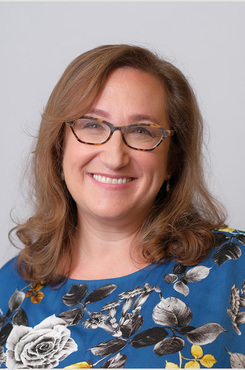170 GCs Pen Open Letter to Law Firms: Improve on Diversity or Lose Our Business
Top lawyers at major companies banded together to craft an ultimatum after seeing "largely male and largely white" new law firm partner classes at Paul Weiss and other firms.
January 27, 2019 at 03:00 PM
6 minute read
The original version of this story was published on The American Lawyer
 Lyft general counsel Kristin Sverchek. (Courtesy photo)
Lyft general counsel Kristin Sverchek. (Courtesy photo)
More than 170 general counsel and corporate legal officers have signed an open letter to big law firms, lamenting new partner classes that “remain largely male and largely white.” The letter says their companies will prioritize their legal spend on those firms that commit to diversity and inclusion.
The letter, released Sunday, has been signed by chief legal officers in a variety of industries, including those in technology, retail, media, hospitality and financial services. The companies range from small tech outfits to large corporations, such as Google Fiber, Etsy, Heineken USA, Chobani Global Holdings, Waymo, Lyft, Vox Media, S&P Global Ratings and Booz Allen Hamilton. (ALM Media's general counsel is also among the signatories.)
“We, as a group, will direct our substantial outside counsel spend to those law firms that manifest results with respect to diversity and inclusion, in addition to providing the highest degree of quality representation. We sincerely hope that you and your firm will be among those that demonstrate this commitment,” reads the letter.
The letter and signatures were shared with ALM and also posted on a general counsel group page on LinkedIn. Many general counsel who signed the letter also plan to email copies to the firms they work with and request that they share it with all their partners, said Michelle Fang, who spearheaded the letter and is chief legal officer at car-sharing company Turo.
 Michelle Fang, chief legal officer at Turo.
Michelle Fang, chief legal officer at Turo.The letter is a direct result of the discussion sparked last month by Paul, Weiss, Rifkind, Wharton & Garrison; Gunderson Dettmer Stough Villeneuve Franklin & Hachigian; and other law firms appearing to promote few women and minorities to partner in their most recent round of promotions. (Paul Weiss chairman, Brad Karp, has since said the firm “can—and will—do better” and has outlined steps the firm has taken to address the issue.)
Fang said a large network of general counsel began discussing law firms that had very diverse promotion classes and those that didn't and they agreed an open letter to firms would have a broader message compared with individual conversations between firms and general counsel.
“We applaud those firms” the letter reads, “that have worked hard to hire, retain, and promote to partnership this year outstanding and highly accomplished lawyers who are diverse in race, color, age, gender, gender orientation, sexual orientation, national origin, religion, and without regard to disabilities.”
“At the same time,” the letter continued, “we are disappointed to see that many law firms continue to promote partner classes that in no way reflect the demographic composition of entering associate classes. Partnership classes remain largely male and largely white.”
While those lawyers in non-diverse new partner classes worked hard and deserved success, the letter said, “We also know that there are women, people of color” and others who are equally deserving but haven't been rewarded.
“We are left to wonder if you and your partners value diversity enough to put into place programs to develop, promote and retain talented and diverse attorneys,” the letter said.
“Collectively, our companies spend hundreds of millions of dollars annually on legal services and we are committed to ensuring equality in the legal profession,” said the letter. “We expect the outside law firms we retain to reflect the diversity of the legal community and the companies and the customers we serve.”
'Bottom Line' Incentive
The letter is meant to address firms that have taken a variety of approaches to diversity, Fang said.
For those firms that have prioritized diversity efforts, Fang said the letter will give “validation and support that they may need with partners to keep doing more of it.” For those firms that are trying but not doing enough to hire and promote diverse attorneys, she said, it gives them the incentive to recommit.
And for those firms not at all focused on improving diversity, it provides an ultimatum. “If they don't continue to invest in these areas, it will ultimately hurt their bottom line. These diversity and inclusion efforts have a good return on investment,” she said. “It will bring them more clients, more talented lawyers and more cases.”
Fang, volunteering to take the lead in drafting the letter, worked with other general counsel in writing it. The letter, which is still open for signatures, spread beyond a women's general counsel group to many others' professional networks.
In interviews, several general counsel ticked off reasons why diversity in law firms mattered, from ethical and equality principles to having an effect on the outcome of cases.
“The only way you can flesh out an idea is with diversity of opinion and that needs to be reflected in the diversity of people giving us the opinion,” said Lyft general counsel Kristin Sverchek, who signed the letter. She said Lyft is considering mandating diversity goals for the law firms it works with, after sharing the letter with firms.
Thomas Chow, a general counsel at online advertising platform PubMatic, said he signed the letter because he has found law firms “need to have repeated and continuous feedback” about the importance of diversity and inclusion at their firms. Sometimes firms trumpet their efforts, but “a lot of the times it feels like lip service when we look at their partner rosters” or promotion announcements, he said.
Chow said the letter was also important to encourage racial and ethnic diversity as well as gender diversity in firms.
Amy Keating, general counsel of Mozilla, the organization behind the popular Firefox browser, said she signed it because she believes collective voices “are powerful voices for change, and especially so when those voices are clients.”
As ALM and others have documented over the years, large law firms have continuously struggled to retain and promote women and diverse attorneys. Among equity partnership ranks at the country's biggest firms in 2017, women made up 19 percent of the 31,658 total partners recorded, according to a National Law Journal survey. Meanwhile, the percentage of minority partners working in Am Law 200 firms and NLJ 250 firms increased just 0.5 percent in 2017, making up 9.1 percent of attorneys in Big Law, The American Lawyer reported last year.
Read More:
Paul Weiss Vows to 'Do Better' After Partner Promotions Stir Diversity Debate
This content has been archived. It is available through our partners, LexisNexis® and Bloomberg Law.
To view this content, please continue to their sites.
Not a Lexis Subscriber?
Subscribe Now
Not a Bloomberg Law Subscriber?
Subscribe Now
NOT FOR REPRINT
© 2025 ALM Global, LLC, All Rights Reserved. Request academic re-use from www.copyright.com. All other uses, submit a request to [email protected]. For more information visit Asset & Logo Licensing.
You Might Like
View All
Neighboring States Have Either Passed or Proposed Climate Superfund Laws—Is Pennsylvania Next?
7 minute read
An Overview of Proposed Changes to the Federal Rules of Procedure Relating to the Expansion of Remote Trial Testimony
15 minute read
Trending Stories
- 1'Didn't Notice Patient Wasn't Breathing': $13.7M Verdict Against Anesthesiologists
- 2'Astronomical' Interest Rates: $1B Settlement to Resolve Allegations of 'Predatory' Lending Cancels $534M in Small-Business Debts
- 3Senator Plans to Reintroduce Bill to Split 9th Circuit
- 4Law Firms Converge to Defend HIPAA Regulation
- 5Judge Denies Retrial Bid by Ex-U.S. Sen. Menendez Over Evidentiary Error
Who Got The Work
J. Brugh Lower of Gibbons has entered an appearance for industrial equipment supplier Devco Corporation in a pending trademark infringement lawsuit. The suit, accusing the defendant of selling knock-off Graco products, was filed Dec. 18 in New Jersey District Court by Rivkin Radler on behalf of Graco Inc. and Graco Minnesota. The case, assigned to U.S. District Judge Zahid N. Quraishi, is 3:24-cv-11294, Graco Inc. et al v. Devco Corporation.
Who Got The Work
Rebecca Maller-Stein and Kent A. Yalowitz of Arnold & Porter Kaye Scholer have entered their appearances for Hanaco Venture Capital and its executives, Lior Prosor and David Frankel, in a pending securities lawsuit. The action, filed on Dec. 24 in New York Southern District Court by Zell, Aron & Co. on behalf of Goldeneye Advisors, accuses the defendants of negligently and fraudulently managing the plaintiff's $1 million investment. The case, assigned to U.S. District Judge Vernon S. Broderick, is 1:24-cv-09918, Goldeneye Advisors, LLC v. Hanaco Venture Capital, Ltd. et al.
Who Got The Work
Attorneys from A&O Shearman has stepped in as defense counsel for Toronto-Dominion Bank and other defendants in a pending securities class action. The suit, filed Dec. 11 in New York Southern District Court by Bleichmar Fonti & Auld, accuses the defendants of concealing the bank's 'pervasive' deficiencies in regards to its compliance with the Bank Secrecy Act and the quality of its anti-money laundering controls. The case, assigned to U.S. District Judge Arun Subramanian, is 1:24-cv-09445, Gonzalez v. The Toronto-Dominion Bank et al.
Who Got The Work
Crown Castle International, a Pennsylvania company providing shared communications infrastructure, has turned to Luke D. Wolf of Gordon Rees Scully Mansukhani to fend off a pending breach-of-contract lawsuit. The court action, filed Nov. 25 in Michigan Eastern District Court by Hooper Hathaway PC on behalf of The Town Residences LLC, accuses Crown Castle of failing to transfer approximately $30,000 in utility payments from T-Mobile in breach of a roof-top lease and assignment agreement. The case, assigned to U.S. District Judge Susan K. Declercq, is 2:24-cv-13131, The Town Residences LLC v. T-Mobile US, Inc. et al.
Who Got The Work
Wilfred P. Coronato and Daniel M. Schwartz of McCarter & English have stepped in as defense counsel to Electrolux Home Products Inc. in a pending product liability lawsuit. The court action, filed Nov. 26 in New York Eastern District Court by Poulos Lopiccolo PC and Nagel Rice LLP on behalf of David Stern, alleges that the defendant's refrigerators’ drawers and shelving repeatedly break and fall apart within months after purchase. The case, assigned to U.S. District Judge Joan M. Azrack, is 2:24-cv-08204, Stern v. Electrolux Home Products, Inc.
Featured Firms
Law Offices of Gary Martin Hays & Associates, P.C.
(470) 294-1674
Law Offices of Mark E. Salomone
(857) 444-6468
Smith & Hassler
(713) 739-1250







